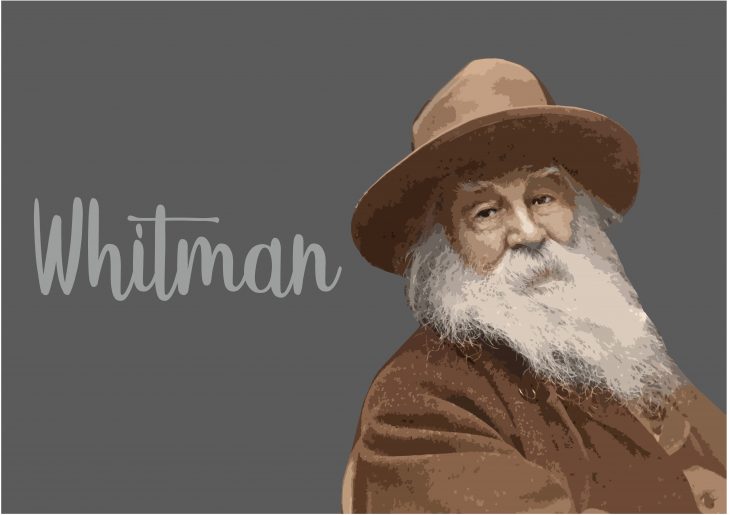
Walt Whitman, one of America’s most celebrated poets, was a literary pioneer whose works continue to resonate with readers around the world. In this article, we delve into the fascinating facts surrounding Walt Whitman’s life, highlighting his unique contributions to literature, thoughts on death, and even his involvement in the war.
Family Background
Walt Whitman hailed from a family of English and Dutch descent. He was the second of nine children born to Louisa Van Velsor and Walter Whitman Sr., a carpenter. This working-class background would later affect Whitman’s perspective and influence his writing.
Youthful Appreciation for Classics
Growing up in Brooklyn and Long Island, young Walt immersed himself in literature, often frequenting bookshops and libraries. He developed a deep appreciation for the classics and was inspired by the works of Shakespeare, Homer, and the Bible.
Journalism and Printing
In his late teens, Whitman worked as an apprentice for several newspaper printers, which exposed him to the power of words and the art of storytelling. This experience would shape his writing style and pave the way for his future literary endeavors.
Magnum Opus: “Leaves of Grass”
Walt Whitman’s magnum opus, “Leaves of Grass,” was first published in 1855. This groundbreaking collection of poems marked a significant departure from traditional poetic conventions. Whitman celebrated the beauty of nature and championed individuality in a way that was both daring and revolutionary. Through his vivid imagery and free verse, Whitman crafted a poetic universe that invited readers to explore their own identities and connect with the world on a deeper level.
Transcendentalism
Whitman’s poetry often explored themes of democracy, love, sexuality, and the interconnectedness of all things. His writings were heavily influenced by transcendentalism, a philosophical movement that emphasized the inherent goodness of both nature and humanity.

Later Editions of “Leaves of Grass”
Over the course of his life, Whitman revised and expanded “Leaves of Grass” multiple times. The final edition, published in 1892, contained over 400 poems. This continuous evolution of his masterpiece reflects Whitman’s commitment to continuous growth.
Breaking Free from Traditional Poetry Structures
Walt Whitman’s rejection of traditional poetic structures, such as rhyme and meter, set him apart from his contemporaries. His unconventional approach allowed for a more organic and personal expression of emotions, thoughts, and observations.
Celebrating the Common Man
Unlike many poets of his time, Whitman found beauty and significance in the lives of ordinary individuals. His egalitarian worldview and ability to elevate everyday experiences have made his poetry accessible and relatable to a wide range of readers.
Inclusion and Equality
Whitman’s poetry embraced diversity and advocated for equality. He celebrated the inherent worth and dignity of all people, regardless of their race, gender, or social status. His forward-thinking views on democracy and human rights made him a poet ahead of his time.
Walt Whitman on Death
Whitman’s thoughts on death are as profound as they are comforting. In his poetry, he explores death as a natural part of the life cycle, finding solace in the idea of continuity and the interconnectedness of all living beings. His words offer a sense of peace and acceptance, reminding us to cherish each moment and find beauty in the inevitability of mortality. Whitman’s contemplations on death reflect his ability to infuse even the most profound subjects with a sense of hope and optimism.

Final Word
Walt Whitman, with his bold and innovative poetry, left an indelible mark on American literature and beyond. His words continue to inspire readers to embrace their individuality, appreciate the beauty of the natural world, and champion the values of democracy and equality. Whitman’s unique perspective on life, death, and the human experience serves as a timeless reminder of the power of words to connect us all.
Frequently Asked Questions (FAQs)
What did Walt Whitman suffer from?
Walt Whitman suffered from various health issues throughout his life, including strokes and the effects of aging. In his later years, he also experienced physical ailments that impacted his ability to write and engage in his usual activities.
What is unique about Walt Whitman?
Walt Whitman’s uniqueness stems from his innovative approach to poetry. He chose to break away from traditional forms and embrace a more organic and personal style. His poetry reflected a deep appreciation for the interconnectedness of all living things, advocating equality for all.
What was Walt Whitman most famous for?
Walt Whitman is most famous for his poetry collection, “Leaves of Grass.” This groundbreaking work revolutionized the world of poetry, exploring themes of individuality, democracy, and the beauty of the natural world.
What did Whitman say about death?
Whitman’s perspective on death was one of acceptance and continuity. He saw death as an inevitable and natural part of life. As such, his poetry offers a sense of peace and celebration of life’s transient beauty.
Did Walt Whitman fight in a war?
Although Walt Whitman did not fight as a soldier in the American Civil War, he volunteered as a nurse and worked in military hospitals, providing care and support to wounded soldiers. His experiences during this time influenced his later writings on war and its effects on humanity.
Was this page helpful?
Our commitment to delivering trustworthy and engaging content is at the heart of what we do. Each fact on our site is contributed by real users like you, bringing a wealth of diverse insights and information. To ensure the highest standards of accuracy and reliability, our dedicated editors meticulously review each submission. This process guarantees that the facts we share are not only fascinating but also credible. Trust in our commitment to quality and authenticity as you explore and learn with us.
